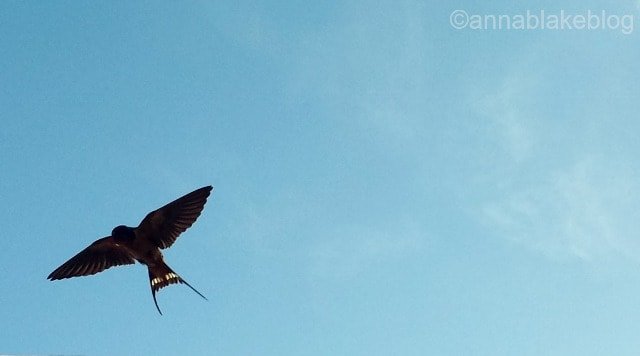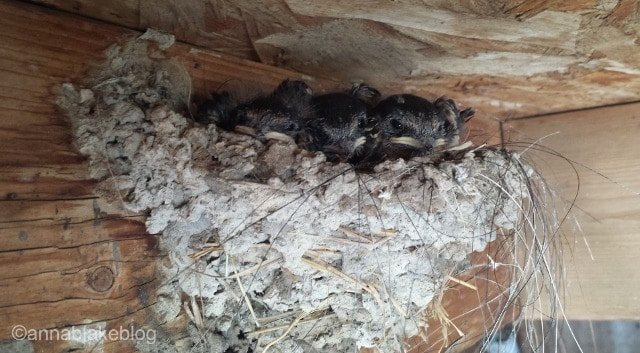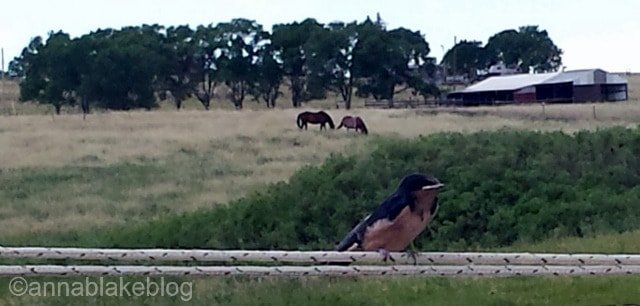 I feel sorry for people who don’t muck. How do they organize their thoughts? Or come up with creative training options? Or share peace of heart with the herd?
I feel sorry for people who don’t muck. How do they organize their thoughts? Or come up with creative training options? Or share peace of heart with the herd?
This time of the year the barn swallows are very busy. They might be my favorite bird. There is some serious competition over on the pond; I have to love the hawks as they hang motionless in the air, watching my farm and giving a plaintive call to the prairie. The pond is totally alive with chatter. There’s always a quackle of ducks with tails up in the air. Herons stalk the edge, stiff with tradition. They keep wary distance and are timeless when airborne, looking just like pterodactyls.
Each spring Canada geese march around my pond, stretching their necks tall, checking the neighborhood to see if we are a worthy nest area. We had never passed the test, but this year a mated pair hatched four eggs. The goslings all survived and are teen-aged now. Their markings make them look over-dressed but then Canada Geese have always been more formal.
I like barn swallows because they have one wing in both worlds: they are wild birds who chose to live with domestic animals. Like mice and rabbits, they appreciate sharing the barn with horses and goats. But it isn’t just affection with us, it’s an exchange of goods and services. They barter the rent on a rafter with active insect control.
Barn swallows are a little fancier than they need to be. Their body angles look like live sumi brush paintings. They disdain everyday brown feathers for a sophisticated color choice: a shiny midnight blue back and wings, and an dapper apricot-colored vest. Long fringe tail feathers on the males seem impractical for daily barn chores, but they are fanatic workers and committed parents.
I get a lot of close-up time with the barn swallows while mucking. The first nest was in the big barn was over the hay with a clear shot at the door, safe and practical. Then the next year they built a nest in the smaller barn but they didn’t even put eggs in that one. Finally two years ago they worked to build a perfect nest of mud and horse tail hair, cemented to an eave above the Grandfather Horse’s run. They rest on the pipe panels and seem to prefer his company. Who can blame them?
 Once the hatch-lings are all un-shelled, their bright yellow rubbery-rimmed beaks are wider than their heads. They are that ready to eat and the parents frantically rush to feed them. Swallows are insectivores who fly as much as 600 miles a day feeding their young. Soon the parents both looked worse for the wear; skinny and a bit flapped out.
Once the hatch-lings are all un-shelled, their bright yellow rubbery-rimmed beaks are wider than their heads. They are that ready to eat and the parents frantically rush to feed them. Swallows are insectivores who fly as much as 600 miles a day feeding their young. Soon the parents both looked worse for the wear; skinny and a bit flapped out.
The babies peer over the side of the nest with their noggins all in a row. As the fledgelings near leaving the nest, the parent’s swooping attacks become frequent and furious toward anyone coming near the barn. It might work against them: As the parents are frantically trying to keep the babies safe, it’s that same frantic activity that alerts us that the babies will be out soon.
The parents are hyper-protective, dive bombing all intruders who might pose a threat. A high percentage of these babies survive, the diligent parenting works. Flying like tiny fighter jets, they make strafing runs over my barn cats.
Since mouse season is in full swing, the cats are coming and going from the barn like factory workers with their wiggling time cards clenched in their teeth, on the way to the picnic table under the tree which everyone agrees is the best place for tormenting mice. The cats pretend to ignore the birds who have no more meat on them than a moth.
Soon the day comes that the babies glide out of the nest and follow the parents to the round pen. It’s a perfect flight training field. The adults stand guard while the young fliers flap and glide from one side to the other, getting steadier each hour. The family is all there until the exhausted fledglings return to the nest.
In a day or two the raids stop and I know the babies are steady on the wing. Now the nest is empty but the sky is full. The young ones have a look of their feathers being too big for them but at least they are finally growing into their beaks. Edgar Rice Burro and I take a break from mucking to watch them soaring over the pond, sweeping up insects. Do birds feel joy?
They are all air and feathers; gravity has no pull. They soar above and glide below the other birds, and we all watch. Ducks have thick wet webbed feet and the heron’s bony knees that stick out, no matter how tightly they fold them. The Grandfather Horse sleeps in the sun and I linger over my muck. Only sparrows fly like jet propelled kites, with a high-speed flip-change of direction on a whim, coasting the pond surface for tasty bugs. They even eat with just a bit more flair that need be.
Compared to grander birds, swallows are probably no big deal. But I marvel, I envy, I lose time watching the miracle again each year. Why is such a small life yet protected so ferociously? What is the hold these little blue kites have on me?
Free as a bird is the old saying. The horses and I never take it for granted. Liberty.
Anna Blake, Infinity Farm.

This one needs to go to Country Magazine. I’m sending you the contact information. Thanks so much for the visit!
What a delight to have a porch sit with you and yours. Decades pass and it’s like we chatted last week. Wonderful to see you. Write on!
Another wonderfully written blog Anna! We have just sent the second crop of swallows off, from the next door stable – guarded from magpies by me and Mopsy.
Love,
Tiny Tim
Sent from my iPad
They do inspire us to help…
…like factory workers with their wiggling time cards clenched in their teeth…
I laughed out loud. I love these words!
Well, you know they love their work! Thanks!
Anna, what a wonderful way you have with words…it was such a treat to enjoy the barn swallows through your eyes and description!
Thanks, and Happy 4th of July!
No Barn Swallows here in the woods, but lots of Tree Swallows. Have you seen them play with a feather in the spring? flying high then dropping it to swoop down for the capture. I used to enjoy the clacking over my head on the kamikaze runs, and would duck just in case they mis-judged the distance!
That’s nice of you to duck, they hate being ignored.
What a well-written essay! I love your use of words as much as the images the words provoke.
Sent from my iPad
>
Thank you!
Anna- I love your words and your descriptions. Mucking time is definitely a time of contemplation and peace. I love the smells and the routine of the fork going up and down. The sounds of the birds and the horses. Feeling the breeze on your face as it blows through the barn. Our Tennessee swallows are fun to watch as well, as they grow and fly. Thanks for sharing. I felt like I was there with you. Pam
Muck Heaven
Wonderfully said……we too have barn swallows that we wait for their return every spring. Your writing paints a beautiful picture, thank you!
Thanks for the compliment. Birds really do cheer up a barn.
A perfect essay Anna. If mucking out helps you write that well, I need more horses 🙂
I do use mine as writer’s therapy. 8 or 9 do the job for me. Not too proud to admit it.
I had to laugh a little as I read this as I wrote about the swallows and their precoscious ways last night. They have been a big part of my mucking out lately as well. They are my favorites and I am so glad to have them. This was a lovely post, I very much enjoy your writing.
Wow.thedancingdonkey.com
Went to your site for a look-see. We have been mucking together…at a distance. Thanks.
Loved this last essay, as always. I have often wondered how non-muckers organized their thoughts. We have sparrows in the neighborhood but none have blessed my barn as yet, sadly. Your descriptions are so very apt – I can feel them flying. Thanks!!
Thank you. When this book of mine gets finished, my first acknowledgement will be to muck. Yay, Zen of Muck Sister!
I loved this essay; I, too, love the barn swallows! When they return in the spring, it’;s no exaggeration (tho perhaps is a cliché) to say they fill my heart with joy!…My old barns have been filled with their nests for many (human) generations; the birds add mud and chicken feathers to several each year; then eventually decide which ones they will actually raise their families in…the nest I walk under every day is now on it’s second brood of the season…..is everyone aware that the North American ones migrate all the way to the southern end of South America each winter?!?!?!… That makes their return all the more astonishing, and reminds us that our farms are part of a web that’s very large, very complex, and full of mystery. The tiny barn swallows have seen places I will never see.
…one little quibble with you all…..I HATE the verb “muck” when used to describe horse stall cleaning….if you are actually removing “muck,” then either your horse is sick, or the stall is shamefully filthy. Healthy cows produce “muck;” horse manure is much tidier than that….Besides, mucking out, muck boots, etc. are British expressions…(maybe you all live in England?!?)…So, if you studied in England and are certified by the British Horse Society, please do pull on those Wellingtons and muck away…However, might we Americans consider using another term? (:
You are so right, the migration of these birds is amazing, maybe the bigger story even… but I love them here, our little connection with the big world. And I admit I am a bit delighted with your opinion on the word ‘muck’. I use it because a beloved mentor used the term, just a way of keeping a bit of her with me, as she has migrated to another place, also somewhere beyond my little barn. Thank you so much for this comment.
It’s funny how almost all your blogs reflect my feelings and emotions for the world around us. I, too, have honed the muck meditation, lingering to watch the humingbirds flit over the honeysuckle creeping the back pasture fence, my mini donkey absolutely enthralled, as I am, with the furious activity and bright colors flashing in the sun. Sigh…then I must muck on and shake a tailfeather for I must go to work and leave nature behind…for now…until I muck again…
I love to think there is a quiet army of happy muckers who share this special time! Thank you for commenting.
Once again, you have written my “favorite” blog. I am a bird lover to the max and I had swallows in my barn as well and I would leave the door open so mama and papa could feed and love the wee ones.
I know it, Karan. We both stand in awe every time someone flies over during a lesson!
Excellent photography of the nest and swallows bringing alive your lovely story. I thought swallows returned to San Juan Capistrano!
I got to do my volunteering with the retired thoroughbreds, it was exciting.It been 37 years since I was close to horses, I think it make take a little while to be comfy around them, but they were pretty nice and I petted a lot of soft muzzles from over the barn door and I got to hold one by the harness while he was being treated, I did not know the language to have him stop though, he just kept walking!!!, Linda that runs FLTRAC Florida Thoroughbred Retirement something, has lost a finger to a bite (horse formerly had to fight for food) and shoulder surgery,she never stops even though it’s overwhelming with about 90 horses and not too much help and funding. One horse has ESM and medication is $1000.00 a month.
The horses are often overeager with excitement to say the least, to join the others when they are led to the pasture and run with the herd when its their turn out.
I heard the Sand Hill Cranes amongst them, very loud strange sound! but did not see them. it poured off and on all day as it does in Florida.I managed to be a bit useful here and there.
I was afraid to get in there and hold ones tail, Linda said I had to get close to the middle of the body and that from a distance was not safe. now I know from my husband that I would have been ok as someone was holding the head, while she treated cellulitis. Yesterday i didnt do it
I hope I will feel comfortable one day. Any tips/ books that may teach me? thanks Anna.
They will inspire you get more comfortable soon, you just need some time. This is my number one tip for all of them. Inhale. Then exhale. Let them hear it. They will probably exhale right after you do. Never underestimate the importance of it. It is what I do first with every horse, every time.
You know I love these bird pieces. Bird peaces.
Thank you, Lara. And you know I hear your voice right next to the editor’s voice. With less peace.
This year sparrows have come and taken over barn swallow nests. Swallows came back for 11th year and no where to nest. They are very passive but after a sparrow nest’s hatchings flew, I knocked down nest hoping that the swallows would rebuild and have their usual delightful hatchings of babies. Any thoughts to help me out!
Sorry, I have no idea about the actual bird science involved. There have been swallow nests that have fallen here and the swallows have built more, so I will hope that for you. Good luck.
So far so good. A new nest being built and the mom and pop sparrows have hopefully gone elsewhere to nest. Also it is not where the old ones were. Only see once and a while the young sparrows fly in looking.
We’ll see. I can’t find a web site that just deals with barn swallows. Do you know of one I can locate?
No, I’ve never researched it. Would the Audubon Society have something??
Unfortunately, English (house) sparrows are a real curse in an old barn (or a new one, for that matter; they even live in “big box” stores!). I think I don’t like them because they’re a bit too much like Homo sapiens; there are too many of them, and everywhere they go, they seem to make a lot of noise and a huge mess! (Unlike the barn swallows, who leave their waste in one tidy pile, the sparrows will cr-p everywhere.) I’ve been fighting a losing battle against them for years in my old barns, but have never had them take over a swallow nest– that’s terrible! If you can reach the nests, I would immediately remove any sparrow eggs if you feel confident that that’s what they are (telling eggs of the two species apart would be difficult, if think, if you are not accustomed to bird egg IDing!). The sparrows will not go elsewhere, and all their family members will stay, too, if you let them. Barn swallows will dive-bomb barn cats to defend their nests, but they will not confront house sparrows, in my experience.
So far so good! Our swallows have nearly finished their new nest… as I said it is in a new place on the covered patio. The sparrows are seen less and less frequently… none today and the new nest is almost above our back kitchen door… and the sparrows leave when they see me… The swallows will ride on our ceiling fan and seem to not mind my talking to them. Crazy but I keep the date they return on our calendar year by year and am so excited that maybe once again we’ll get to enjoy at least two hatchings And yes, we’ve taken pictures of the babes before they fly as they all sit in a row on the nest. We live with a river behind us and when the swallows return each year, many, many nests are built under the bridge leaving out subdivision. (it’s a small town) I will continue to keep posted!
Good news! The sparrows left! I believe that we have eggs and soon will have a hatching. We’ve also for the first time a ‘working’ nest on the same covered patio in a small three hole vertical bird house… I believe the birds are wrens… and the swallows and they are happily living as neighbors.